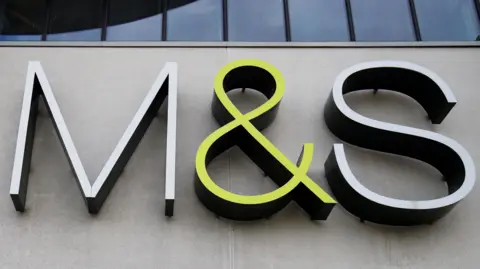**M&S Customers in Limbo as Cyber Attack Chaos Continues**
As the repercussions of a severe cyber attack continue to affect Marks & Spencer (M&S), customers are expressing their frustrations regarding delayed orders, unfulfilled deliveries, and lack of communication from the retailer. The incident, disclosed by M&S last Monday, has led to significant disruptions across various operational facets of the company, notably within online ordering and payment systems.
Despite the retailer’s acknowledgment of the attack, specific details regarding the nature of the breach remain poorly outlined. M&S has made headlines for the unsettling impact this incident has had on its customer service and overall customer experience. Many individuals have reported not only issues with parcel deliveries but also complications in gift card transactions, leaving several services temporarily inoperative.
Amid continued uncertainty, one of the core complaints from M&S customers revolves around communication. Many feel that the level of information shared regarding affected orders has been inadequate. Analysts have pointed out that this cyber incident could have severe ramifications on the retailer’s reputation, especially given its pivotal role in the UK retail landscape.
The share price of M&S has taken a hit, dropping 2.5% in morning trading shortly after the news broke and nearly 10% over the past week. Customers like Linda Sonntag from Norwich have spoken out about their experiences, including an instance in which a flower delivery meant for a friend never arrived. Despite recognizing the challenges posed by the cyber attack, Sonntag noted that M&S’s failure to communicate effectively regarding order status was disappointing, emphasizing a need for improved customer service in such crises.
Similarly, Dawn Cunnington from Exeter also encountered minimal communication regarding her flower order, especially as she had intended to surprise her elderly mother on a special occasion. Following her inquiries, she received a refund along with a £10 apology voucher, but frustrations persisted as to why M&S allowed her order to be placed without informing her of the existing cyber issue.
Many customers have described how they were left scrambling, needing to seek alternative options for orders they believed were secure. Others felt compelled to cancel their purchases, particularly for clothing intended for vacations, or found themselves unable to return previously bought items. The impact of this attack transcends individual orders, affecting customer relationships and potentially income streams for the retailer.
Amid the chaos, a notable point of sympathy was directed toward M&S staff. Reports indicated that employees have faced undue stress and even encountered hostility from irate customers unable to complete transactions, as many payment systems had been rendered ineffective. These employees are tasked with managing the fallout, often addressing complaints despite having no control over the cyber complications at hand.
In terms of recovery efforts, M&S remains largely silent on the specifics of the cyber attack. The company has enlisted external cybersecurity experts to evaluate and rectify the situation. It is expected that these teams prioritize identifying the source of the breach and eliminating it from the company’s systems. Analysts suggest that temporarily disabling certain operational servers may be a strategic maneuver to safeguard against further infiltration and to contain the breach.
Industry professionals, like Sam Kirkman from NetSPI, have indicated that the reinstatement of online services may take longer due to the prioritization of in-store operations, which allows companies to manage immediate threats effectively. However, the overarching sentiment remains: the longer it takes M&S to restore full functionality, the greater the potential damage to its brand reputation.
With around one-third of its clothing and household goods sales occurring through digital platforms—a figure reaching approximately £1.268 billion—M&S’s online presence is integral to its business model. The cyber attack’s timing, coinciding with warmer weather, has raised further concerns about clothing sales dropping as summer collections await customers unwilling to risk online buying amid security uncertainties.
As customers consider their trust in M&S potentially waning, the long-term effects of this cyber incident could resonate far beyond immediate operational setbacks, casting doubt on the safety and reliability of the retailer’s online transactions. Overall, the resolution of this scenario remains a critical focus for both M&S and its loyal customer base, as the retailer’s success is built significantly on customer trust.










